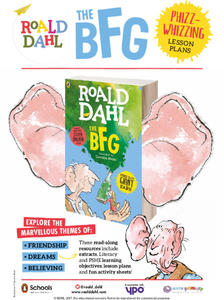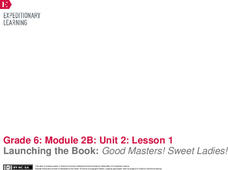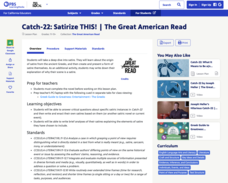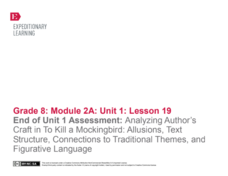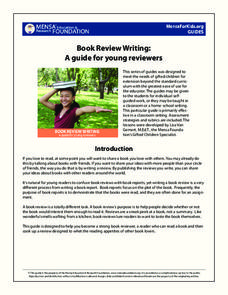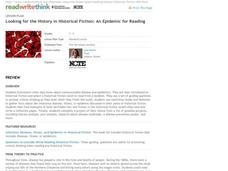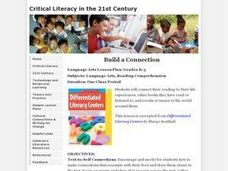Roald Dahl
The BFG Lesson Plans
A 55-page unit examines the novel, The BFG, by Roald Dahl. Six lessons pay close attention to friendship, dreams, and believing themes while analyzing interesting characters, writing creative vocabulary, smilies, metaphors, an exciting...
Roald Dahl
Roald Dahl Matilda Lesson Plans
Fifty eye-catching pages contain six lessons about Roald Dahl's novel, Matilda. Each lesson has a theme and covers a different subject—literacy, social-emotional learning, science, and geography. Scholars analyze characters, examine...
EngageNY
Getting the Gist and Determining Word Meaning: Paragraphs 12–14 of Steve Jobs’ Commencement Address (and connecting to Chapter 8)
Groups use a Venn diagram to compare the theme of love and loss in Steve Jobs' 2005 commencement address to Stanford University students and Christopher Paul Curtis' Bud, Not Buddy.
Prindle Institute for Ethics
My Dream of Martin Luther King
Conduct a book study of the story, My Dream of Martin Luther King by Faith Ringgold. Followng a read-aloud, scholars take part in philosophical discussions covering the topics of freedom, equality, race, and heroes.
EngageNY
Launching the Book: Good Master! Sweet Ladies!
Every person has a different story to tell. Scholars take a quick look at the book Good Masters! Sweet Ladies! Voices from a Medieval Village. They discover that each character tells a different story. They then look at one...
EngageNY
Module Reflection and Writing Book Reviews
Scholars take time to reflect on the unit and the end-of-unit writing assessment. They use a Working Conditions Reflection to help guide them through the exercise. Readers then begin working on a book review for the book they have been...
PBS
Catch-22: Satirize This!
Some assignments are great, some can become great, and some have greatness thrust upon them. This one is great. After completing Joseph Heller's classic satire, Catch-22, groups craft and present their own political satire.
EngageNY
End of Unit 1 Assessment: Analyzing Author’s Craft in To Kill a Mockingbird: Allusions, Text Structure, Connections to Traditional Themes, and Figurative Language
Scholars demonstrate their learning with an end-of-unit assessment. They work independently to discuss the Golden Rule and its relationship in To Kill a Mockingbird.
EngageNY
End of Unit 2 Assessment, Part Two: Final Draft of Analytical Essay
What's one way to make a good essay great? Revise! Scholars revise their drafts from a previous lesson plan to help write their final polished analytical essays about the universal refugee experience. They also practice properly citing...
Prestwick House
Fahrenheit 451—Activity Pack
The burning questions is at what point do readers of Fahrenheit 451 recognize the many literary devices Ray Bradbury employs in his dystopian classic that warns of a society that uses media to indoctrinate the public and denigrates...
University of North Carolina
Book Reviews
Reading goes beyond taking in information—it also involves forming impressions about what we read. Sometimes we share those impressions through book reviews, a specific type of writing outlined in a handout on the topic. Using the...
Appalachian State University
The Fault in Our Stars: A Movie Study Guide for Eighth Grade Language Arts, Social Studies, and Science
How would you spend your last days with a loved one? The movie guide for The Fault in Our Stars prompts scholars to compare important scenes from the novel to the film and contains background information about the author, guided...
Curated OER
Book Report Task Cards
With 52 task cards, learners will not run out of things to do with a book they are reading independently or with the class. Tasks include making a poster on a specific topic, writing a summary, drafting a sequel, creating a windsock,...
Hampton-Brown
From "First Crossing"
Young scholars look closely at four tales taken from the collection of short stories, First Crossing edited by Donald R. Galloby. While examining the life of four teenagers and the lives they lead as U.S. immigrants, your enthusiastic...
Hampton-Brown
Esperanza Rising
Accompany a reading of the novel, Esperanza Rising by Pam Muñoz Ryan, with a series of lessons that dive deep into the literary world of a young girl and the journey she takes to start a new life. Lessons and their...
EngageNY
Qualities of a Strong Literary Argument Essay
One activity, two essays, and one central theme: qualities of an argument essay. Here, scholars first describe the qualities of an argument essay regarding Bud's rules to live by from the novel Bud, Not Buddy by Christopher Paul Curtis....
MENSA Education & Research Foundation
Book Review Writing: a Guide for Young Reviewers
Encourage scholars to share their love of reading with informative and engaging book reviews. Here, you'll find a series of guides that walk learners through the review writing process. Included in the collection is information about...
ReadWriteThink
Looking for the History in Historical Fiction: An Epidemic for Reading
Combine informational reading skills with fictional text in an innovative historical fiction lessons. After reading a fictional text related to diseases, class members read non-fictional text to gain knowledge about specific infectious...
Curated OER
Speak: Questioning Strategy - ReQuest Strategy
The best way to analyze a piece of literature is to ask questions about the characters, plot, and theme. Encourage your learners to stump the teacher with the most difficult questions they can create using Bloom's Taxonomy and various...
Curated OER
Regarding the Fountain: Questioning Strategy—Cubing
Look deeper into the text with a reading strategy based on asking critical thinking questions. While reading Reading the Fountain by Kate Klise, learners think of questions that help them describe, compare, associate, analyze, apply, and...
EngageNY
Text-Dependent Questions and Making a Claim: Digging Deeper into Paragraphs 20–23 of Steve Jobs’ Commencement Address (and connecting to Chapter 11)
In preparation for the unit exam, groups employ the strategies they have been practicing to formulate an interpretative claim about the connections between Christopher Paul Curtis's " Bud, Not Buddy, and Steve Jobs' 2005 Stanford...
EngageNY
Getting the Gist and Determining Word Meaning: Paragraphs 20–23 of Steve Jobs’ Commencement Address (and connecting to Chapter 10)
Groups create a list of the character traits of Steve Jobs and Buddy, the main character of Christopher Paul Curtis' Bud, Not Buddy, and share and select evidence from Jobs' 2005 Stanford University Commencement Address to support their...
EngageNY
Text-Dependent Questions Text-Dependent Questions and Making a Claim: Digging Deeper into Paragraphs 12–14 of Steve Jobs’ Commencement Address (and connecting to Chapter 9)
Readers draw connections between Bud, Not Buddy and Steve Jobs' 2005 Stanford University commencement address and cite evidence from the two texts to support their analysis.
Curated OER
Build a Connection
Learners discuss their personal connections with stories they've read in the past and identify techniques to connect with more stories. They create illustrations, construct task cards, and complete sentence stems based on books they read...


